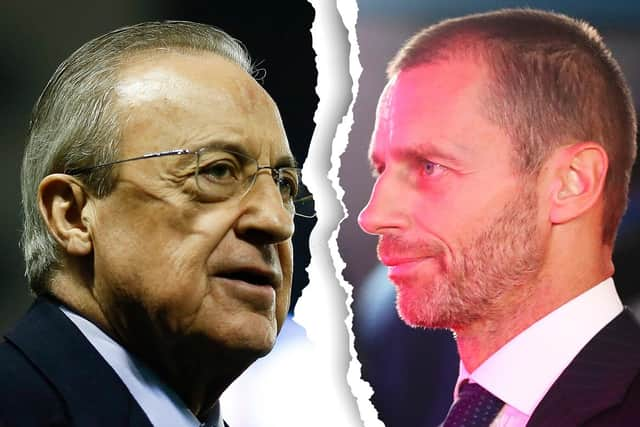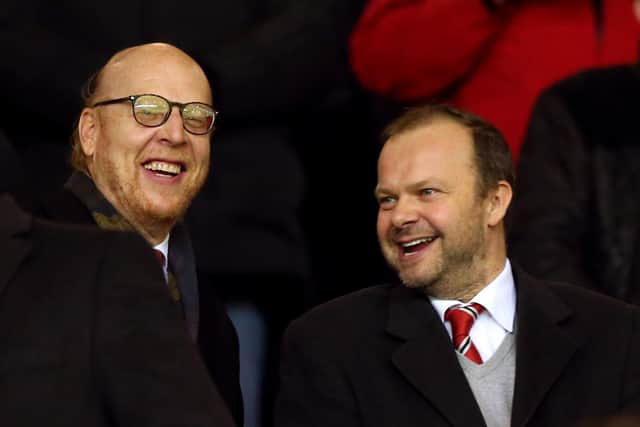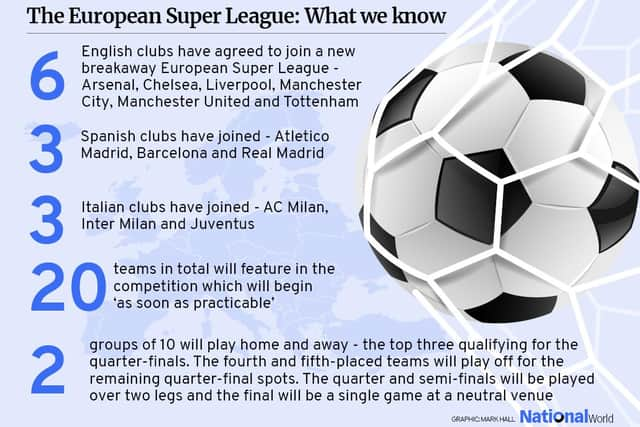Why is European Super League bad for football? Uefa and Premier League opposition to new competition explained
News of a new European football competition to rival the Champions League has been met with widespread criticism from authorities and pundits.
The European Super League has already seen the biggest clubs from England, Spain and Italy sign up, with others set to follow from across the continent.
Advertisement
Hide AdAdvertisement
Hide AdThe Premier League’s heavyweight hitters have already announced their intentions - but why has it caused such a stir among the football community?


Let’s find out.
What have the European Super League organisers said?
The new midweek league will see 20 teams split into groups of 10 to play home and away fixtures, with the top placed teams qualifying for the knockout rounds.
The quarter final and semi final stages will be played over two legs, with the final planned for a single match to be held at a neutral venue in May.


One of the six Premier League clubs who have signed up as founding members, Manchester United, are said to be heavily involved in the ESL’s formation.
United’s co-chairman Joel Glazer has been named vice-chairman of the ESL.
He said: “By bringing together the world’s greatest clubs and players to play each other throughout the season, the Super League will open a new chapter for European football, ensuring world class competition and facilities, and increased financial support for the wider football pyramid.”
New European Super League will feed fans’ ‘passion for the game’


This was backed up by Real Madrid president and the ESL’s first chairman Florentino Perez.
Advertisement
Hide AdAdvertisement
Hide AdHe said: “We will help football at every level and take it to its rightful place in the world. Football is the only global sport in the world with more than four billion fans and our responsibility as big clubs is to respond to their desires.”
Fellow ESL vice-chairman and Juventus chairman Andrea Agnelli said the new competition will feed fans’ “passion for the game”.
“Our 12 Founder clubs represent billions of fans across the globe and 99 European trophies. We have come together at this critical moment, enabling European competition to be transformed, putting the game we love on a sustainable footing for the long-term future, substantially increasing solidarity, and giving fans and amateur players a regular flow of headline fixtures that will feed their passion for the game while providing them with engaging role models,” he said.
What has been the reaction from the rest of football?
The ESL proposal has been met with widespread criticism from across the game.
Critics range from the Premier League and UEFA to the UK prime minister Boris Johnson and former Manchester United player turned pundit Gary Neville.
Key elements include the automatic qualification of 15 clubs every year, the threat to the domestic leagues around Europe, and impact on clubs’ fans.
FIFA, the game’s world governing body, has said it won’t recognise the competition and that players who play in the ESL could be denied the chance to play at a World Cup.
Europe’s governing body UEFA, who organise the Champions League, have also dug their heels in by warning players they won’t be able to compete in other competitions - be it domestic, European or on the world stage - or play for their national teams.
Advertisement
Hide AdAdvertisement
Hide AdThere are, however, legal matters to consider, among other aspects, such as the potential for restraint of trade for players, which was integral in the Bosman ruling in 1995.
Both the game’s governing bodies and the ESL have signaled their intent for open talks.
What did Gary Neville say about the European Super League?
Former Manchester United defender turned Sky Sports pundit Gery Neville argued the point against the breakaway league, and took aim at his club and Liverpool.
“I’m disgusted with Manchester United and Liverpool the most,” Neville said.
“They’re breaking away to a competition they can’t be relegated from? It’s an absolute disgrace. It’s pure greed, they’re impostors. The owners of Man United, Liverpool, Chelsea and Man City have nothing to do with football in this country. They’re an absolute joke. Time has come now to have independent regulators to stop these clubs from having the power base. Enough is enough.”
PM Boris Johnson was also against the plans put forward by the ESL.
He said: “These clubs are not just great global brands - of course they're great global brands - they're also clubs that have originated historically from their towns, from their cities, from their local communities, they should have a link with those fans, and with the fan base in their community. So it is very, very important that that continues to be the case. I don't like the look of these proposals, and we'll be consulting about what we can do.”